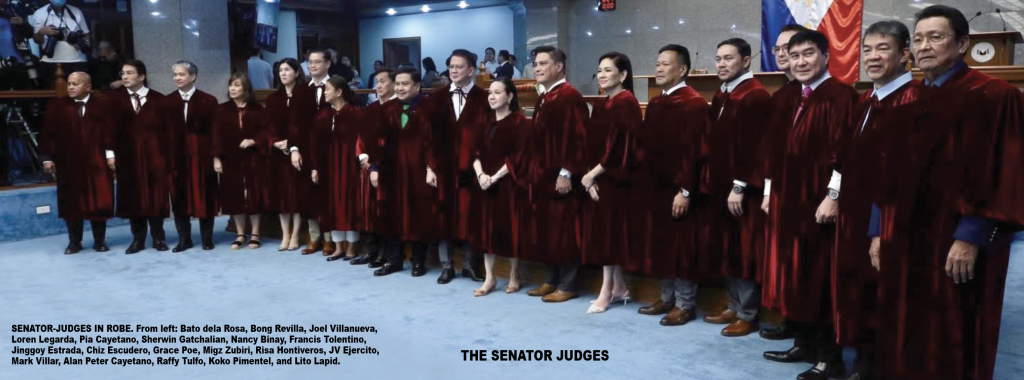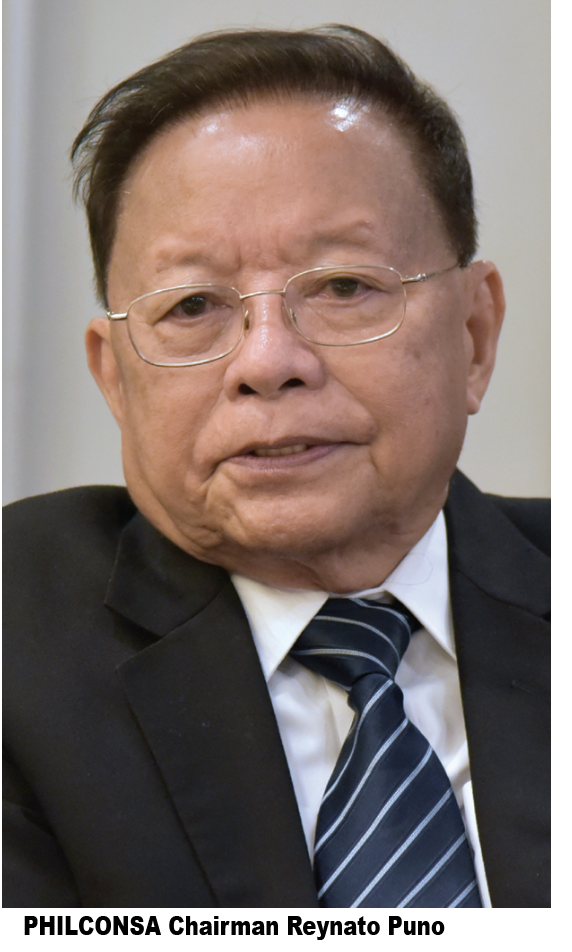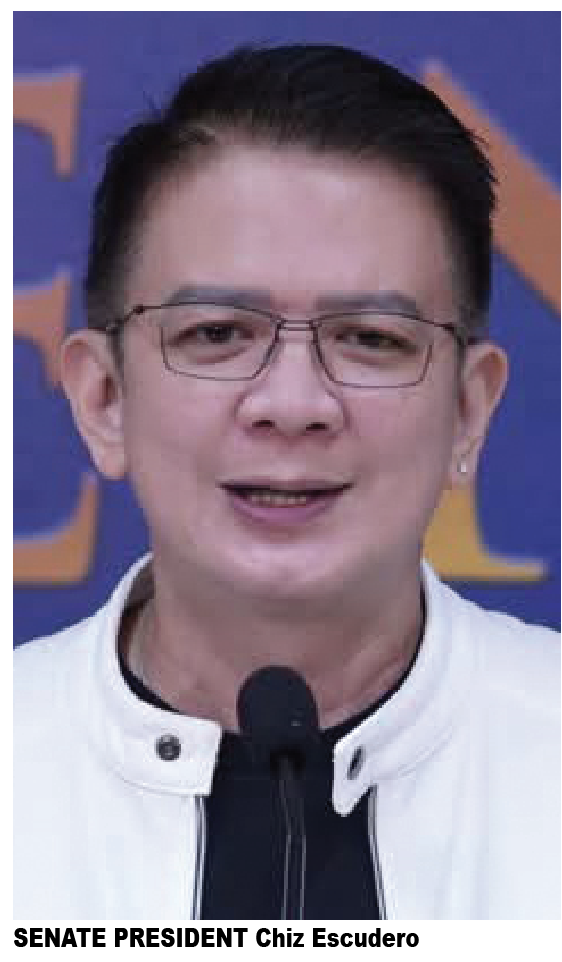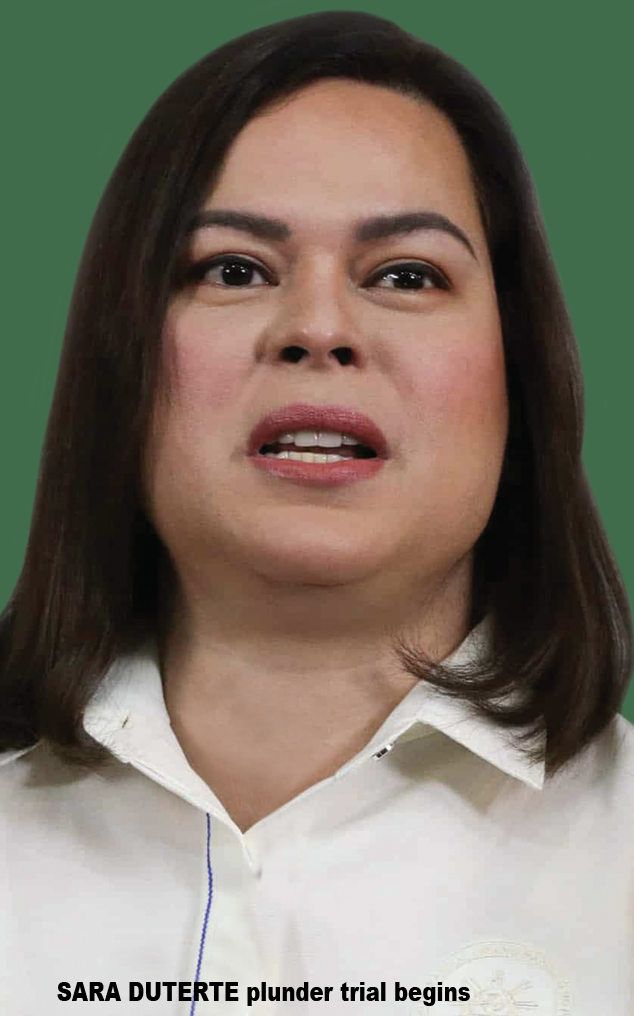By TONY LOPEZ

Finally, the trial of the impeached vice president, Sara Duterte has begun.

Francis “Chiz” Escudero, Senate President of the 19th Congress took his oath as presiding officer of the Senate Impeachment Court, on Monday, June 9, 2025. Then 22 senators took their oath as judges before Escudero, the following day, Tuesday, June 10. That Tuesday, the Senate convened itself as an impeachment court.
The senator judges solemnly swore “that in all things pertaining to the trial of the impeachment of Vice President Sara Duterte now pending, I will do impartial justice according to the Constitution in the laws of the Philippines. So help me God.”
Under the Constitution, as in the US Constitution, the Senate, as a constitutional office of accountability, sits as a High Court of Impeachment to consider evidence, hear witnesses, and vote to acquit or convict an impeached official.

The court began work in earnest on Tuesday, June 10, when the senator judges voted 18-5 with no abstentions, to remand or return the articles of impeachment to the House of Representatives, for two reasons: One, that the House clarifies that it did not violate the only one impeachment rule against the same person in one year (the House said it did not); and two, that the House commits to pursue the case before the Senate of the 20th Congress which begins on July 1, 2025.
Evening of June 11, Senate Impeachment Court Presiding Judge Escudero sent a writ of summons to Vice President Sara for her to answer within ten days, the impeachment allegations against her made by 215 congressmen, and to appear before the Senate as a court on a date and time set by Presiding Judge Escudero.
Seven charges
Duterte faces seven articles of impeachment or charges, all very serious allegations of crimes, which if proven could result in her conviction, ouster as vice president, and perpetual disqualification from public office.

The seven charges include: Conspiracy to assassinate President Marcos, First Lady Liza Araneta Marcos, and Speaker Martin Romualdez; malversation of P612.5 million in confidential funds; bribery and corruption at DepEd; unexplained wealth and failure to disclose assets; extrajudicial killings; destabilization, insurrection, and public disorder; and betrayal of public trust, culpable violation of the Constitution, and graft and corruption.
Three previous impeachment cases were all ruled against the defendants—for non-crimes.
FIRST, Impeached Chief Justice Renato Corona was declared guilty and ousted for just one omission—he did not declare in his statement of assets and liabilities and net worth (SALN) his dollar account.
SECOND, Under the law, Filipinos are allowed to keep secret dollar accounts. Joseph Estrada was ousted by People Power as president after his majority senator backers in the Impeachment Court refused to open an envelope supposedly containing damning evidence of illegal wealth. It did not. But Erap was ousted just the same.
THIRD, Ombudsman Merceditas Gutierrez resigned even before she could face trial at the Senate.
The Philippine Constitution Association (PhilConsa), the oldest and most authoritative voice on constitutional law, has denounced the Senate’s remand of the Articles of Impeachment to the House.
“This action raises grave constitutional questions and challenges the integrity of the impeachment process,” said PhilConsa, thru its chair, former Chief Justice Reynato Puno.
“It may constitute grave abuse of discretion and risks undermining the most fundamental principle of our constitutional democracy: that Public Office is a Public Trust,” the venerable Philconsa warned.
“The Accountability of Public Officials cannot be overstressed — and must never be evaded through procedural artifice.”
Said Philconsa:
Once the Senate is clothed with jurisdiction as an Impeachment Court upon receipt of the Articles of Impeachment, that jurisdiction cannot be lost or suspended by mere procedural acts. It remains until final resolution or dismissal by the Court itself.
As the Supreme Court held in REP v. Sandiganbayan: “Jurisdiction, once validly acquired, is not lost by subsequent happenings. It continues until the case is finally resolved or dismissed.”
This principle of continuing jurisdiction applies with full force to the Impeachment Court — a doctrine reinforced by established practice, including the Clinton Impeachment trial before the U.S. Senate, whose model our own impeachment process follows.
Constitutional concerns
The remand order raises the following constitutional concerns:
Grave Abuse of Discretion — Whether the Senate unlawfully suspended its jurisdiction already validly acquired as an Impeachment Court.
Encroachment on the House’s Exclusive Power — Whether requiring the House to certify compliance with the one-year ban infringes upon the House’s sole prerogative under Article XI, Section 3 of the Constitution.
Circumlocutory Delay — Whether imposing novel requirements not found in the Constitution or Senate Rules constitutes a circumlocutory device designed to delay or defeat the trial.
Due Process and Impartiality — Whether raising possible defenses on behalf of the Respondent compromises the impartiality of the Senate as an Impeachment Court.
Fundamental Question of Law — Is the mere lack of certification from the House of Representatives sufficient to justify remand of the case and suspension of trial?
PhilConsa submits that no such requirement exists under the Constitution or established impeachment practice.
To create such a requirement ex post facto undermines both the separation of powers and the rule of law.
At stake is not merely the fate of one official, but the integrity of the Constitution itself.
Impeachment is the people’s mechanism to enforce Accountability of Public Officials.
It must not be thwarted by procedural invention or partisan maneuver.
PhilConsa calls upon the Senate to uphold its constitutional duty and proceed with the impeachment trial in accordance with the Constitution and the rule of law.
Any act or device that circumvents this duty gravely imperils our democratic institutions.
The Filipino people are watching. The Constitution commands it.
The importance of Accountability of public officials cannot be overstressed.
Circumlocutory compliance with the Constitution destroys the rule of law which is the bedrock of democracy.
